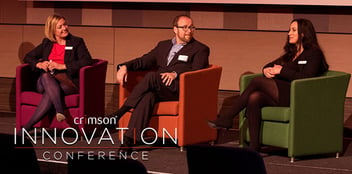How to leave your IT job with dignity, and why
The IT jobs market is currently extremely active, which is giving a lot of technology professionals the opportunity to progress their career quickly by switching roles frequently.
However, the consultants in Crimson’s IT recruitment agency know only too well the impact that leaving an employer on bad terms can have on a candidate’s future career prospects. So, we’ve put together some tips on how take advantage of professional opportunities, whilst retaining your good reputation, and without leaving your previous employer in the lurch.
Never forget, the way that you leave an organisation can enhance your personal brand. Here’s some rules on to how quit your IT job with dignity.
1, Prepare before announcing your resignation
There are several steps you need to take before handing your resignation letter to your boss. Firstly, review any agreements you have signed that outline key information, like; notice periods, unused holiday days, non-compete clauses etc. This will ensure you know all the facts about how you are required to leave the company.
Next, reflect on all the positive things you have achieved and enjoyed about working at the organisation. It will be useful to have an arsenal of nice things to say, so your boss does not feel that you are leaving on a sour note, or because of her / him.
Also consider your motives and keep these at the back of your mind; you’re leaving because you have been presented with a new opportunity to progress your IT career, you want to be remembered as a good person by your colleagues, and you want to maintain healthy relationships with all your co-workers because you may want to work with them again in the future.
Research resignation letter templates online, then draft a typed letter that thanks your boss and the organisation, states your intentions, and includes the date.
Finally, control when you leave as much as possible. You should try to quit after you have received any bonuses and commissions, so there aren’t degrading arguments over money. However, you should also try to give your boss as much notice as possible, as it is very hard to recruit good people and they will appreciate that you’re trying to help them.
If your boss decides to terminate your contract immediately, that is out of your control. If this happens, try to show as much respect and courtesy as you can. You may want to prepare by removing any personal information from your work-based digital devices.
2, How to resign from your IT job with self-respect
As soon as you walk into the meeting in which you will resign, you must forget all your grudges and pent-up emotions. Don’t use the meeting to criticise your boss, your colleagues, or the organisation. You’re trying to move forward, not look backwards at negative aspects of the past. In addition, remember your resignation is not just about you, it will create some challenges for your boss, so be mindful of their feelings too.
Despite writing an official letter, you should deliver the news to your boss in person. Even if this makes you feel uncomfortable. This will earn you respect, and your boss will be able to see you are genuinely trying to progress but you’re also grateful of the opportunities she / he has given you.
You must also offer to help your boss with the transition of you leaving. This might mean helping them to find a successor for you, training new employees, and scrupulously documenting your work.
During the resignation meeting, your boss may wish to give you a counter offer or to negotiate your leaving period. Just remember to be fair but firm. Help your boss as much as possible, as long as his / her requests don’t impact on your next position. Also, counter offers usually mean ‘staying for the money’, and often they don’t work out. Ask yourself if its worth going through another painful resignation meeting in six months’ time.
Once an agreement has been made, ask your boss how she/ he would like you to communicate the news of your resignation. She / he may want you to wait a while before telling junior colleagues.
3, How to behave after resigning from an IT job
You should go above and beyond for your boss and colleagues until the last minute of your last day with the organisation. Slacking off and jeopardising projects won’t help you to foster the reputation you want. CIO magazine suggests that “your attitude should convey that even though you’re leaving this is a great place to work”.
Therefore, don’t drop hints that you’re leaving before an official announcement is made, don’t gloat about your new job, don’t solicit your colleagues to come work for your new employers, and don’t criticise any of your co-workers or the organisation.
Make sure your personal space, drawers, desks, and office are immaculate before you leave. This attention to detail won’t go unnoticed.
Most importantly, schedule leaving drinks with your colleagues, so you can celebrate and go out on a high, having created some more fond memories!
Crimson is an IT consultancy, an IT solutions provider, an IT recruitment agency, and a Microsoft Gold Partner operating across the UK.


